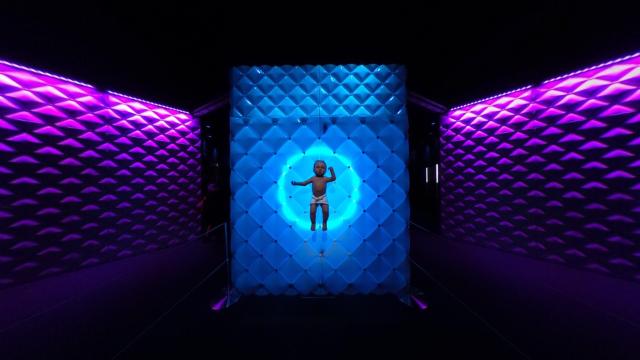Fantasies of immortality and extended life preservation are likely as old as humanity itself, but new advances in robotics and advanced artificial intelligence models are inching those transhumanist tales closer to reality at a rapid pace. AI researchers and entrepreneurs eager to cash in on our deepest-rooted anxiety are already developing AI replicas of aging humans that can capture some glimpse of a loved one’s soul.
Today, companies like HereAfter and Deepbrain AI are using the same underlying tech employed for deepfakes and chatbots in order to create digital replicas of people before they die. These replicas use data and personal memories provided by the soon-to-be deceased human to create a convincing copy. Others, like those at the transhumanist group Digital Immortality Now, are similarly developing methods and protocols to properly log and collect data which they say could one day be used by an advanced superintelligence AI to digitally resurrect a deceased person.
Separately, advances in shockingly life-like robotics systems hint at a future where those digital replicas could have a body they use to move around in the world. Hanson Robotics, a Hong Kong-based robot manufacturer formed in 2013 has already developed several creepy-looking humanoid robots modeled after humans that speak and interact with others in the style of the human they are based on. The result is a textbook definition of the uncanny valley.
Here are a handful of AI and robotic companies working, in various ways, to bring people back from the dead.
‘The Gift of Being Remembered’

HereAfter is an artificial intelligence startup that attempts to create a virtual replica of you that your family and friends can access long after you’ve kicked the bucket. The company uses a “virtual interviewer” (AKA a chatbot ask a potential series of questions about themselves and their life history. HereAfter then instructs users to submit audio recordings of the subject talking about memorable moments of their life as well as a handful of photos to make the replica more personal.
Armed with all that data, HereAfter says they can make a virtual replica of yourself your ones can interact with at any moment.
As far as startups promising a digital afterlife with today’s current generative AI models go, most of them are working on some variation of HereAfter’s model.
Hanson Robotics Could Resurrect People as Lifelike Machines
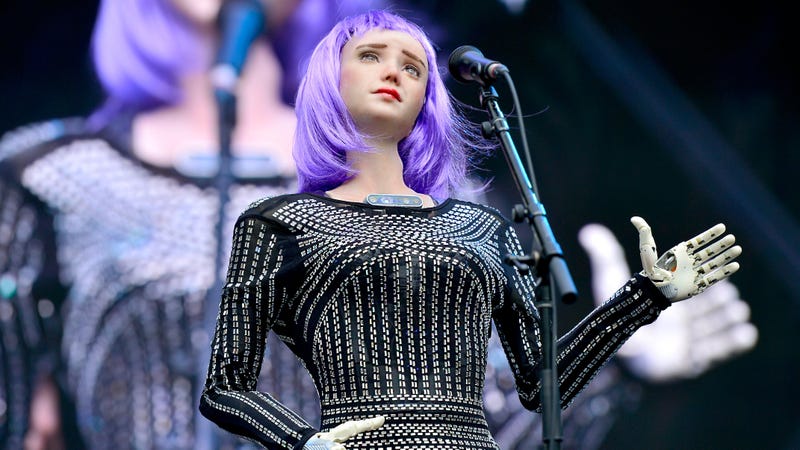
Hanson Robotics is combining advanced AI language models with highly realistic robotics technology in an effort to create a life-like robot with the appearance and unique personality of a human. The company claims its life-like robots are able to maintain eye contact, recognise faces, and hold natural conversations in order to build real relationships. Sophia, one of Hanson Robotics’ leading research robots, can be seen cracking jokes and playing rock paper scissors on the Tonight Show with Jimmy Fallon.
reMaster Will Plaster a Digital Clone Of Yourself on a 400-inch Screen
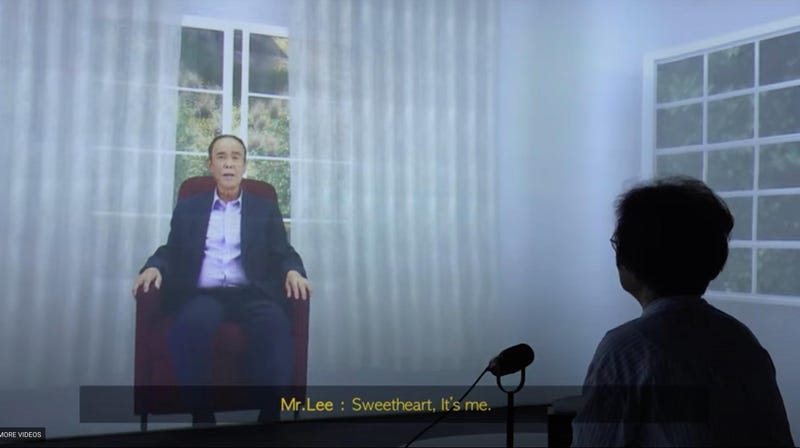
ReMemory claims its AI technology will let loved ones have full-length actual conversations with deceased loved ones via a virtual copy of themes in a memory hall. The company conducts around seven hours of interviews with a client before they die and then uses additional data collected and deep learning technologies to create a virtual clone. The virtual version of the person can then send personalized notes or and video messages to loved ones on birthdays, anniversaries, or other special days. Grieving partners or children can also request to speak with the virtual person in a specialized memorial showroom featuring a 400-inch screen.
Digital Immortality Now Will Help You Prepare for AI Jesus
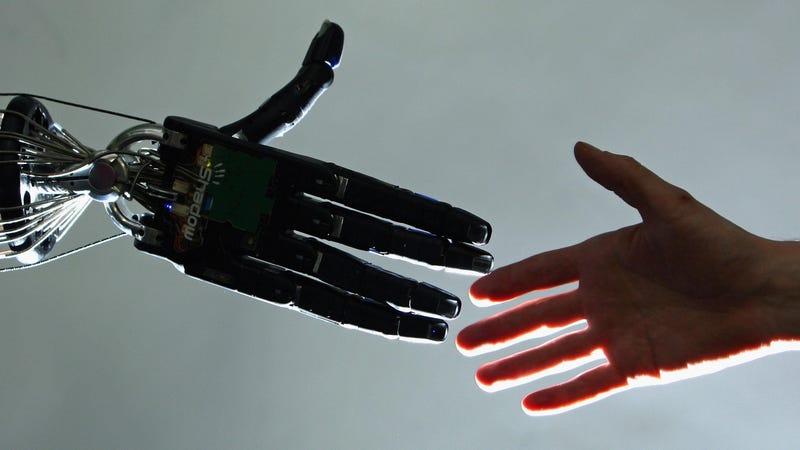
Russian transhumanist Alexey Turchin has a plan for preserving life indefinitely, though it involves a powerful future AI program that does not currently exist. He wants to be ready when it does. Through his company Digital Immortality Now, Turchin says he has developed a framework for collecting and documenting data about an individual that could one day be instrumental in their “future reconstruction.”
Turchin’s “uploading protocol” involves collecting DNA samples, creating art about personal memories, and video logging daily routines and interactions with others. In the future, Turchin believes super intelligent AI will be able to take those logs and data points and convincingly reconstruct the subject’s personality. It’s essentially a mission to reignite a person’s soul long after their physical body has decayed.
AI Replicas Could Merge With These Off-Shelf Humanoid Robots

Promobot develops life-like androids they say can be modelled to look like anyone on Earth. Like the Hanson Robotics bot before, Promobot attempts to mimic real human communication by way of over 600 different facial expressions. The company claims its robots already work in at least 35 countries where they focus on virtual “administrators, promoters, consultants, guides and concierges.” Though admittedly not the most glamorous route to eternal life, some intrepid transhumanists could theoretically have a Promobot built in their image and instruct it to communicate using an AI model trained on the deceased person’s voice and personality.
Video Game Developers and Movie Makers Are Already Resurrecting Actors
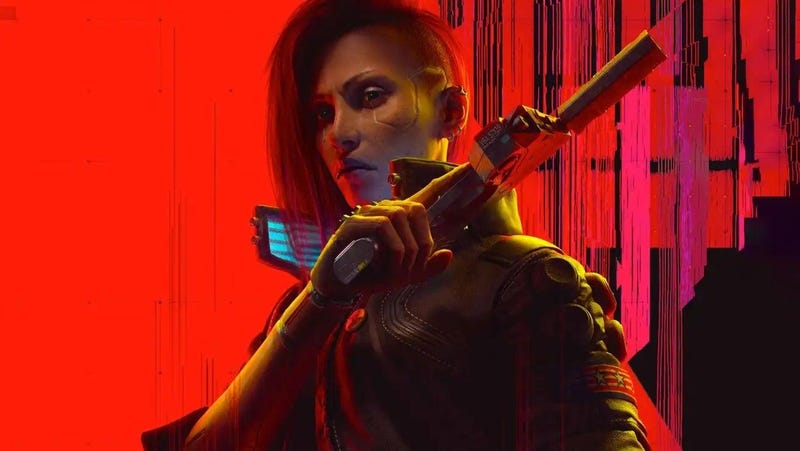
CD Project Red, the Polish video game developer behind Cyberpunk 2077 recently used voice cloning technology offered by a company called Respeecher to create new lines for the now-deceased Polish voice actor Miłogost Reczek. Those lines were then included as part of the Cyberpunk 2077 Phantom Liberty Expansion. Major film studios have also deployed AI cloning and deepfake technology to reconstruct the likeness of dead actors and insert them into films. For anyone unaware of the technology being used, this process can create the illusion of characters or start living on indefinitely.
For Those Who Prefer Their Meat Vehicle, Cryonic Chambers Are Here, and They Are Very Cold

If you’ve ever watched a space opera or played sci-fi action video games, you’re probably somewhat aware of cryonics. Somewhere in a cold room, a vat opens and smoke spreads across the floor as a seemingly frozen human from years prior is removed and warmed back to life.
That’s essentially what Alcor, a real-world cryonics company, claims to offer. The company claims it will send a staff member to stay near a dying person for around a week before they die. Then, in a critical few moments after the ailing individual’s heart stops beating and they are pronounced legally dead, the real work begins. Within the first two hours of the patient’s death, Alcor says it will artificially restore blood circulation and breathing in order to protect critical organs like the brain. The patient is then placed into an ice bath where their blood is removed and replaced with an “organ preservation solution.”
Filled with the solution, the body is then transported to Alcor’s facilities in Arizona. It’s recommended the patient try and die near there. Once in the facilities, Alcor says it puts “cryoprotectants’ into the bloodstream in order to try and prevent total freezing which could damage organs. The patient is then cooled down to -196° C and prepares for potentially hundreds of years of waiting. Alcor believes they can effectively “pause” death. Actually reviving that cryopreserved patient, however, still remains impossible.
